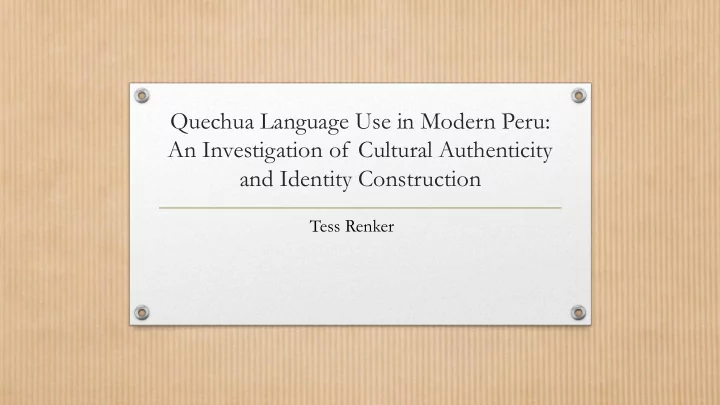

Quechua Language Use in Modern Peru: An Investigation of Cultural Authenticity and Identity Construction Tess Renker
What is Quechua? • Indigenous language spoken mainly in Andean nations of South America • Language of the Incas • 8 million Quechua-speakers worldwide; 3.5 million speakers in Peru alone • Primarily oral language • Considered to be in decline – an endangered language
Racial and Cultural Discrimination • Discrimination against Quechua-speakers has as much to do with culture as it does with race • Quechua language almost impossible to disconnect from indigenous cultures • Quechua associated with ignorance, poverty, and a “campesino” lifestyle • Use of Quechua almost immediately excludes speakers from Peruvian society
“Performances” of Mestizo Identities • Quechua- speakers often forced to “perform” a mestizo identity to avoid racial and cultural discrimination • Adapt the clothing, lifestyle, and often language of the hegemonic Peruvian majority • Forced to limit or cease use of Quechua to achieve socioeconomic mobility • Many prefer not to speak Quechua with their children as a means of protecting them
Idealization of Quechua Language and Culture • Quechua also linked with an idealized conception of Indigenous peoples • Indexes “Machu Picchu,” “ancestors,” “forefathers,” “archeological remains,” etc. • Linked to a certain nostalgia for simpler times and campesino lifestyles • Oversimplification of contemporary indigenous cultures • Designation of indigenous peoples as an “exotic other”
“Performance” of Oversimplified Indigenousness • Indigenousness becomes commoditized • Individuals “perform” Incan -indigenous stereotypes for economic advancement • Traits that normally attract discrimination valued for their “exoticism” • Quechua language use marks one as “authentically indigenous” or “authentically Incan”
Conclusion • Quechua speakers are both victims of racial-cultural discrimination and the subjects of criticism related to the authenticity of their own indigenousness • Often must adopt or “perform” an alternate identity as a means of survival
Recommend
More recommend